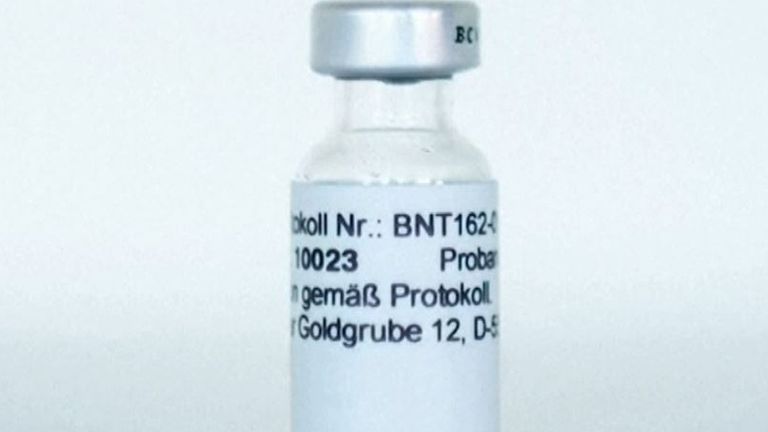The prime minister has welcomed news that a COVID-19 vaccine has been found to be 90% effective in preventing people from getting the virus, but says “we absolutely cannot rely on this news as a solution”.
Speaking at a Downing Street news conference, Boris Johnson said these are “very, very early days” and “the biggest mistake we could make now is to soften our resolve”.
He later added: “There is a long way before we have got this thing beat.”
It comes after pharmaceutical company Pfizer announced that its COVID-19 vaccine, which is being developed with BioNTech, has been found to be 90% effective in preventing people from getting the virus.
Mr Johnson said the news was a sign that the “scientific cavalry” is on its way, but he preached cautious optimism.
The PM said the coronavirus vaccine had cleared a “significant hurdle” but there were more to overcome before it can be rolled out widely.
Mr Johnson said he had talked about the “distant bugle of the scientific cavalry coming over the brow of the hill” with a breakthrough.
“I can tell you that tonight that toot of the bugle is louder, but it’s still some way off, we absolutely cannot rely on this news as a solution,” he said.
“The biggest mistake we could make now would be to slacken our resolve at a critical moment.”
Answering questions from journalists he reiterated this point, saying: “I remain buoyantly optimistic about the prospects of this country next year.
“I just don’t want to let people run away with the idea that this development is a home run, a slam dunk, a shot to the back of the net, yet.
“There is a long way before we have got this thing beat.”
Professor Jonathan Van-Tam, deputy chief medical officer for England, said it was a “very important scientific breakthrough” and he was “hopeful” the first vaccine could be seen by Christmas.
He characterised the development as akin to a football team taking the lead in a penalty shootout.
“You haven’t won the cup yet, but what it does is it tells you that the goalkeeper can be beaten,” Professor Van-Tam said.
But echoing the PM’s urge for caution, he said “we don’t yet know” when life can return to normal or when restrictions can start to be lifted.
“Frankly, we’re in the middle of the second wave, and I don’t see the vaccine making any difference for the wave we are now in,” Professor Van-Tam said.
“I’m hopeful that it may prevent future waves, but this one we have to battle through to the end without a vaccine.”
Analysis: PM right to be cautious
By Thomas Moore, science correspondent
The prime minister had a tricky balancing act as he gave his reaction to the vaccine.
Any politician would want to promise a better future, an end to the pandemic, a return to normal life.
But he knows the danger of complacency. Would some people give up on lockdown, ditch the masks and get together with friends if the take home message was a vaccine was just weeks away?
He peppered his comments with words like “interim results”, “potentially good news” and “we cannot let our enthusiasm run away with us.”
He’s right to be cautious, however bright the prospects.
So far the vaccine has only been shown to be effective a few days after the second dose. Nobody knows how long that protection will last. The trials haven’t been going for long enough.
Nor have Pfizer and BioNTech released evidence that the jab protects the elderly. They need a vaccine the most, but their immune systems tend to respond less well.
And while the clinical trials show the vaccine prevents disease, it may not stop spread of the virus – so we would need to live with some social distancing.
As the deputy chief medical officer said as he stood alongside the PM: “We’ve seen a swallow, but this is very much not the summer.”

